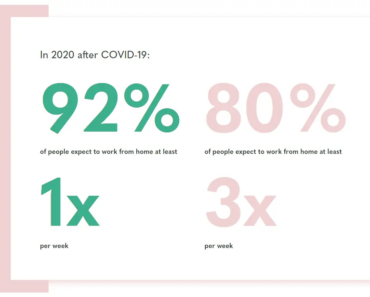
Man sitting with a girl working on laptop
Imagine a world where your office is anywhere you choose, your daily commute lasts mere seconds, and your work-life balance is finally within reach.
Welcome to the remote work era, an unstoppable movement that’s been on the rise even before the coronavirus pandemic, and has only gained momentum since.
In fact, Gallup reveals that nearly 60% of U.S. employees are remote employees who are keen on continuing this arrangement, with 90% of remote workers planning to stay in this mode for the entirety of their careers.
It’s not difficult to understand the appeal of remote work.
Remote employee cherish the flexibility and autonomy it offers, in both location and working hours.
But it’s not just remote employee who reap the rewards of this flexible arrangement.
Employers who embrace teleworking soon discover that they’re not trading performance for convenience.
On the contrary, they can enjoy a multitude of benefits, from reduced costs and environmental impacts to increased productivity and employee retention.
Cutting-edge technology, like Office 365, 4G/5G, and shared public Wi-Fi, has made remote working more accessible and cost-effective than ever before.
If you’re contemplating the leap into remote work, or considering crafting a remote working policy, it’s essential to carefully weigh your options and address the potential challenges.
After all, the question on everyone’s mind is: is remote work truly a good idea? We’re sharing 9 amazing benefits of remote working in this blog post.
Table of Contents
9 Benefits of Remote Work That You Must Know
Remote work has been a game-changer for countless professionals, offering numerous advantages that enrich both personal and professional lives.
We’re exploring 9 top benefits of remote work that showcase its impact on employees, employers, the economy, and the environment.
Healthy Work-Life Balance
A flexible work schedule is often a benefit of remote work, allowing employees to enjoy healthy work life balance and adapt their day around personal commitments, as long as their work is completed and meets expectations.
This autonomy over one’s schedule makes it easier to manage personal responsibilities, from dropping kids off at school to running errands or attending an online fitness class.
The better work life balance leads to better physical and mental health.
Reduced Commute Stress
In the U.S., the average one-way commute time is 27.1 minutes.
This means that nearly an hour is spent traveling to and from work daily.
Lengthy commutes contribute to stress, anxiety, and various health issues.
By eliminating the need to commute, remote job supports mental and physical well-being while providing extra time for personal priorities and save money from daily commuting.
Location Independence
Remote worker is free from geographic restrictions, providing access to a wider range of job opportunities.
This is especially beneficial for individuals in rural areas or those who move frequently, such as military spouses.
Remote work also helps employees avoid high living costs associated with major metropolitan areas.
Boosted Inclusivity
Companies can foster diversity and inclusion by hiring remotely, as it allows for employees from various socioeconomic, geographic, and cultural backgrounds to join the team.
Remote work also benefits those who might struggle with traditional employment, such as individuals with disabilities or caregivers who need flexible schedules.
Financial Savings
Working from home can result in significant savings for both employees and employers.
Workers can save on expenses like transportation, clothing, and meals, while companies can cut overhead costs, real estate expenses, and transit subsidies.
Environmental Benefits
Prior to the pandemic, remote workers helped reduce greenhouse gas emissions by the equivalent of removing over 600,000 cars from the road annually.
Telecommuters can also contribute to environmental sustainability by using less paper and managing energy consumption more efficiently.
Support for Sustainability Initiatives
Remote work aligns with various sustainability goals, including economic growth, reduced inequalities, sustainable cities, and responsible consumption.
Reducing commuter travel is a quick and cost-effective way for employers and employees to lower their carbon footprint and combat climate change.
Heightened Productivity and Performance
Due to flexible work schedule, remote work often leads to fewer distractions, resulting in increased productivity.
By focusing on performance rather than office presence, companies and employees can concentrate on what truly matters.
In fact, surveys have shown that remote workers report higher productivity levels due to flexible schedule and other factors like fewer interruptions and quieter work environments.
Improved Happiness and Health
Remote work has been shown to boost happiness, well-being, and employee loyalty, as due to flexible work schedule, it lower stress levels, provide more time for personal interests, and strengthen relationships.
Furthermore, remote work can lead to better health by encouraging physical activity, healthier eating, and reducing exposure to illnesses.
By embracing remote work, employees and employers alike can enjoy these benefits, fostering a happier, healthier, and more sustainable work-life balance.
Conclusion: Finding the Balance
While remote work offers numerous advantages, it is not without its drawbacks.
Challenges such as remote employees blurred boundaries between work and personal life can lead to increased stress and burnout if not carefully managed.
Remote employees may also experience feelings of isolation and disconnection from their colleagues, potentially impacting team cohesion and communication.
Also, maintaining a consistent routine and staying motivated can be difficult without the structure of an office environment.
However, despite these challenges, the benefits of remote work often outweigh the drawbacks.
By taking deliberate steps for better work life balance, employees working remotely can mitigate these potential issues and fully enjoy the flexible schedule and numerous other advantages that working from home has to offer.







